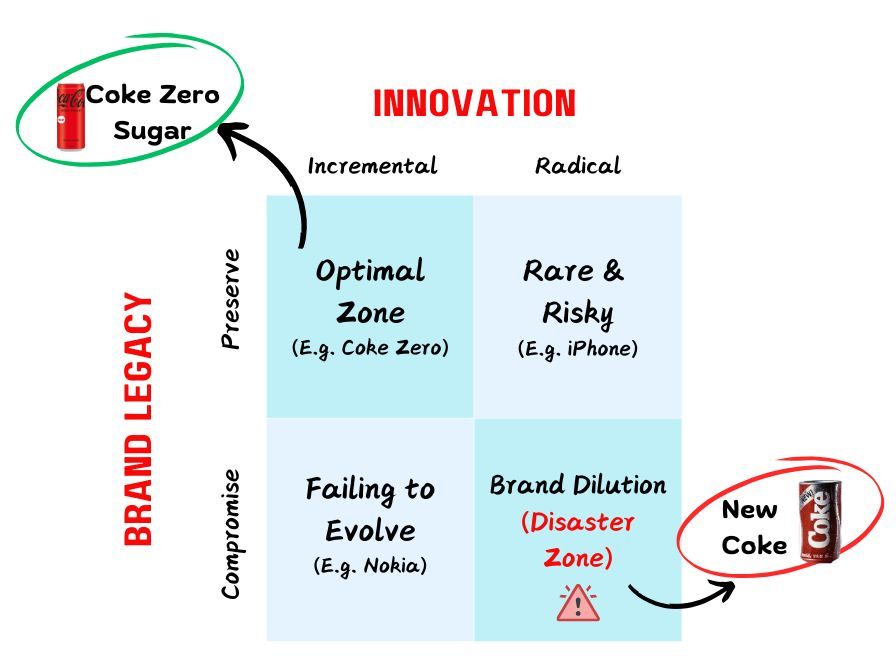Why did New Coke Failed Miserably but Diet Coke is an Instant hit?
Let's Decode the Business Strategy in [ 2 X 2 ]
In 1985, Coca-Cola made one of the boldest (and worst) decisions in business history - they killed 𝗖𝗹𝗮𝘀𝘀𝗶𝗰 𝗖𝗼𝗸𝗲 and replaced it with 𝗡𝗲𝘄 𝗖𝗼𝗸𝗲.
𝘞𝘩𝘢𝘵 𝘩𝘢𝘱𝘱𝘦𝘯𝘦𝘥 𝘯𝘦𝘹𝘵 𝘸𝘢𝘴 𝘤𝘩𝘢𝘰𝘴.
- Coca-Cola's hotline, which typically received about 400 calls a day, was flooded with up to 1,500 complaints daily 📞
- Protesters poured New Coke into sewers. 💢
- One guy was so upset, that he sued the company for emotional damages! 🗯️
Within months, they had to bring back Classic Coke, branding it "𝐂𝐨𝐜𝐚-𝐂𝐨𝐥𝐚 𝐂𝐥𝐚𝐬𝐬𝐢𝐜."
𝑺𝒐 𝒘𝒉𝒚 𝒅𝒊𝒅 𝒔𝒖𝒄𝒉 𝒂 𝒎𝒂𝒔𝒔𝒊𝒗𝒆 𝒇𝒂𝒊𝒍𝒖𝒓𝒆 𝒉𝒂𝒑𝒑𝒆𝒏 𝒊𝒏 𝒕𝒉𝒆 𝒇𝒊𝒓𝒔𝒕 𝒑𝒍𝒂𝒄𝒆 𝒂𝒏𝒅 𝒘𝒉𝒂𝒕 𝒄𝒂𝒏 𝒘𝒆 𝒍𝒆𝒂𝒓𝒏 𝒇𝒓𝒐𝒎 𝒕𝒉𝒊𝒔?
𝚆̲𝚎̲𝚕̲𝚕̲,̲ ̲𝚒̲𝚝̲ ̲𝚠̲𝚊̲𝚜̲𝚗̲’̲𝚝̲ ̲𝚋̲𝚎̲𝚌̲𝚊̲𝚞̲𝚜̲𝚎̲ ̲𝚘̲𝚏̲ ̲𝚝̲𝚊̲𝚜̲𝚝̲𝚎̲.̲
𝗡𝗲𝘄 𝗖𝗼𝗸𝗲 𝗼𝘂𝘁𝗽𝗲𝗿𝗳𝗼𝗿𝗺𝗲𝗱 𝗖𝗹𝗮𝘀𝘀𝗶𝗰 𝗖𝗼𝗸𝗲 𝗮𝗻𝗱 𝗣𝗲𝗽𝘀𝗶 𝗶𝗻 𝗯𝗹𝗶𝗻𝗱 𝘁𝗮𝘀𝘁𝗲 𝘁𝗲𝘀𝘁𝘀.
It failed because Coca-Cola underestimated the power of 𝗲𝗺𝗼𝘁𝗶𝗼𝗻 and 𝗻𝗼𝘀𝘁𝗮𝗹𝗴𝗶𝗮 and how deeply people connect with brands they love.
Coca-Cola wasn’t just selling a drink - it was selling an 𝑒𝑥𝑝𝑒𝑟𝑖𝑒𝑛𝑐𝑒, a 𝑙𝑒𝑔𝑎𝑐𝑦, and a 𝑙𝑖𝑓𝑒𝑠𝑡𝑦𝑙𝑒. New Coke disrupted that brand identity by dismissing the intangible value consumers placed on the original formula.
𝗦𝗼 𝘄𝗵𝗮𝘁 𝗰𝗮𝗻 𝘄𝗲 𝗹𝗲𝗮𝗿𝗻 𝗳𝗿𝗼𝗺 𝘁𝗵𝗶𝘀? 𝗟𝗲𝘁’𝘀 𝗯𝗿𝗲𝗮𝗸 𝗶𝘁 𝗱𝗼𝘄𝗻 𝘄𝗶𝘁𝗵 𝗮 𝘀𝗶𝗺𝗽𝗹𝗲 𝟮 X 𝟮.
𝗢𝗻 𝗼𝗻𝗲 𝗮𝘅𝗶𝘀: Preserve Brand Legacy vs. Compromise Brand Legacy.
𝗢𝗻 𝘁𝗵𝗲 𝗼𝘁𝗵𝗲𝗿: Incremental Innovation vs. Radical Innovation.
1. Incremental Changes (Safe Zone)
2. Radical Changes (High Risk)
3. Fail to Evolve (Irrelevant)
4. Brand Dilution (Disaster)
New Coke? It landed in the Disaster Zone—a radical change that compromised their legacy. What should Coca-Cola have done?
What should Coca-Cola have done?
They could’ve introduced New Coke as an option alongside 𝐂𝐥𝐚𝐬𝐬𝐢𝐜 𝐂𝐨𝐤𝐞 like they later did with 𝐂𝐨𝐜𝐚-𝐂𝐨𝐥𝐚 𝐙𝐞𝐫𝐨 𝐒𝐮𝐠𝐚𝐫.
What do you think?
Can innovation hurt a brand? Have you seen other examples like this?











